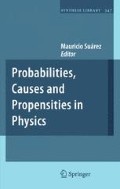Abstract
A general probability space is defined to be causally complete if it contains common cause type variables for all correlations it predicts between compatible variables that are causally independent with respect to a causal independence relation defined between variables. The problem of causal completeness is formulated explicitly and several propositions are presented that spell out causal (in)completeness of certain classical and non-classical probability spaces with respect to a causal independence relation that is stronger than logical independence.
Access this chapter
Tax calculation will be finalised at checkout
Purchases are for personal use only
References
Arntzenius, F. (1993), The common cause principle, PSA 1992 2, 227–237.
Butterfield, J. (1989), A space-time approach to the Bell inequality, In J. Cushing and E. McMullin (eds.), Philosophical Consequences of Quantum Theory. Notre Dame: University of Notre Dame Press, pp. 114–144.
Cartwright, N. (1987), How to tell a common cause: Generalization of the conjunctive fork criterion. In J. H. Fetzer (ed.), Probability and Causality, Dordrecht: Reidel, pp. 181–188.
Fraassen, B. V. (1977), The pragmatics of explanation. American Philosophical Quarterly 14, 143–150.
Fraassen, B. V. (1982), Rational belief and the common cause principle, In R. McLaughlin (ed.), What? Where? When? Why? Dordrecht: Reidel, pp. 193–209.
Fraassen, B. V. (1989), The Charybdis of realism: Epistemological implications of Bell’s Inequality, In J. Cushing and E. McMullin (eds.), Philosophical Consequences of Quantum Theory. Notre Dame: University of Notre Dame Press, pp. 97–113.
Gyenis, B. (2005), On formal, purely probabilistic theories of evidence, Masters Research Paper, Department of History and Philosophy of Science, University of Pittsburgh.
Gyenis, B. and Rédei, M. (2004), When can statistical theories be causally closed?, Foundations of Physics 34, 1285–1303.
Haag, R. (1992), Local Quantum Physics. Berlin: Springer.
Hofer-Szabó, G. and Rédei, M. (2004), Reichenbachian Common Cause Systems, International Journal of Theoretical Physics 43, 1819–1826.
Hofer-Szabó, G. and Rédei, M. (2006), Reichenbachian common cause systems of arbitrary finite size exist, Foundations of Physics Letters 35, 745–746.
Hofer-Szabó, G., Rédei, M. and Szabó, L. (1999), On Reichenbach’s common cause principle and Reichenbach’s notion of common cause, The British Journal for the Philosophy of Science 50, 377–398.
Hofer-Szabó, G., Rédei, M. and Szabó, M. (2000a), Common cause completability of classical and quantum probability spaces, International Journal of Theoretical Physics 39, 913–919.
Hofer-Szabó, G., Rédei, M. and Szabó, L. (2000b), Reichenbach’s common cause principle: Recent results and open questions, Reports on Philosophy 20, 85–107.
Placek, T. (2000a), Is Nature Deterministic? Cracow: Jagellonian University Press.
Placek, T. (2000b), Stochastic outcomes in branching space-time. An analysis of Bell theorems, The British Journal for the Philosophy of Science 51, 445–475.
Rédei, M. (1995a), Logical independence in quantum logic, Foundations of Physics 25, 411–422.
Rédei, M. (1995b), Logically independent von Neumann lattices, International Journal of Theoretical Physics 34, 1711–1718.
Rédei, M. (1997), Reichenbach’s common cause principle and quantum field theory, Foundations of Physics 27, 1309–1321.
Rédei, M. (1998), Quantum Logic in Algebraic Approach, Vol. 91 of Fundamental Theories of Physics. Dordrecht: Kluwer.
Rédei, M. (2002), Reichenbach’s common cause principle and quantum correlations, In T. Placek and J. Butterfield (eds.), Modality, Probability and Bell’s Theorems, Vol. 64 of NATO Science Series, II. Dordrecht: Kluwer pp. 259–270.
Rédei, M. and Summers, S. (2002), Local primitive causality and the common cause principle in quantum field theory, Foundations of Physics 32, 335–355.
Rédei, M. and Summers, S. (2005), Remarks on causality in relativistic quantum field theory, International Journal of Theoretical Physics 44, 1029–1039.
Rédei, M. and Summers, S. (2007), Quantum probability theory, Studies in the History and Philosophy of Modern Physics 38, 390–417.
Reichenbach, H. (1956), The Direction of Time. Los Angeles MA: University of California Press.
Salmon, W. (1978), Why ask “Why?”? Proceedings and Addresses of the American Philosophical Association, 51, 683–705.
Salmon, W. (1980), Probabilistic causality, Pacific Philosophical Quarterly 61, 50–74.
Salmon, W. (1984), Scientific Explanation and the Causal Structure of the World, Princeton NJ: Princeton University Press.
Sober, E. (1984), Common cause explanation, Philosophy of Science 51, 212–241.
Sober, E. (1988), The principle of the common cause, In J. Fetzer (ed.), Probability and Causality. Boston MA: Reidel, pp. 211–228.
Sober, E. (2001), Venetian sea levels, British bread prices, and the principle of common cause, The British Journal for the Philosophy of Science 52, 331–346.
Spohn, W. (1991), On Reichenbach’s principle of the common cause, In W. Salmon and G. Wolters (eds.), Logic, Language and the Structure of Scientific Theories, Pittsburgh PA: University of Pittsburgh Press.
Summers, S. (1990), Bell’s inequalities and quantum field theory, In Quantum Probability and Applications V., Vol. 1441 of Lecture Notes in Mathematics. Berlin, Heidelberg, New York: Springer, pp. 393–413.
Suppes, P. (1970), A Probabilistic Theory of Causality. Amsterdam: North-Holland.
Uffink, J. (1999), The principle of the common cause faces the Bernstein paradox, Philosophy of Science, Supplement 66, 512–525.
Author information
Authors and Affiliations
Corresponding author
Editor information
Editors and Affiliations
Rights and permissions
Copyright information
© 2011 Springer Netherlands
About this chapter
Cite this chapter
Gyenis, B., Rédei, M. (2011). Causal Completeness in General Probability Theories. In: Suárez, M. (eds) Probabilities, Causes and Propensities in Physics. Synthese Library, vol 347. Springer, Dordrecht. https://doi.org/10.1007/978-1-4020-9904-5_7
Download citation
DOI: https://doi.org/10.1007/978-1-4020-9904-5_7
Published:
Publisher Name: Springer, Dordrecht
Print ISBN: 978-1-4020-9903-8
Online ISBN: 978-1-4020-9904-5
eBook Packages: Humanities, Social Sciences and LawPhilosophy and Religion (R0)

